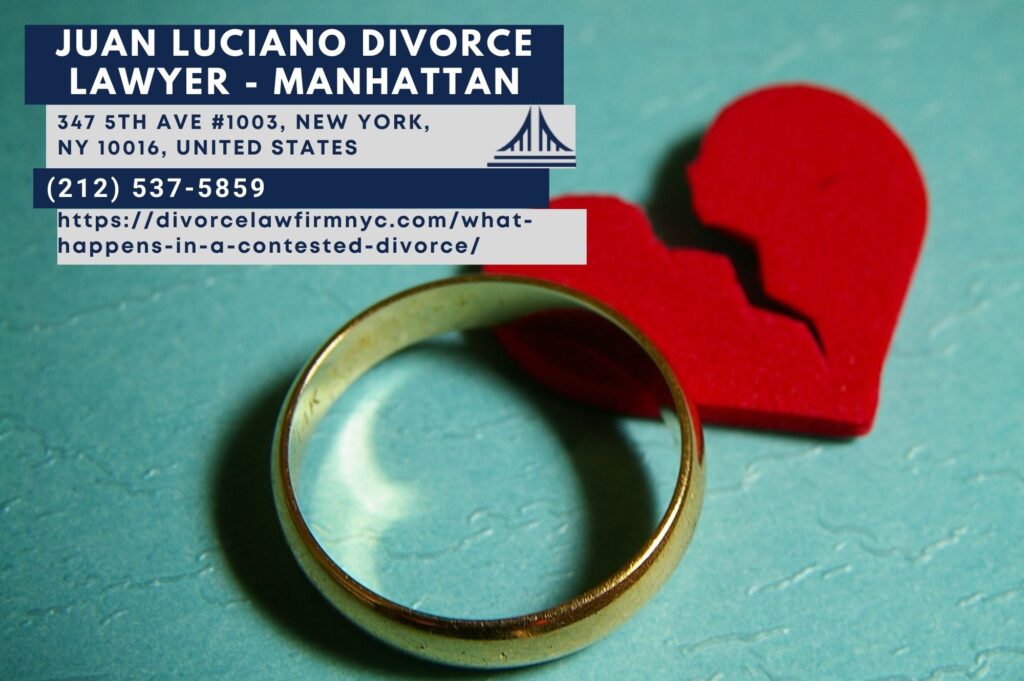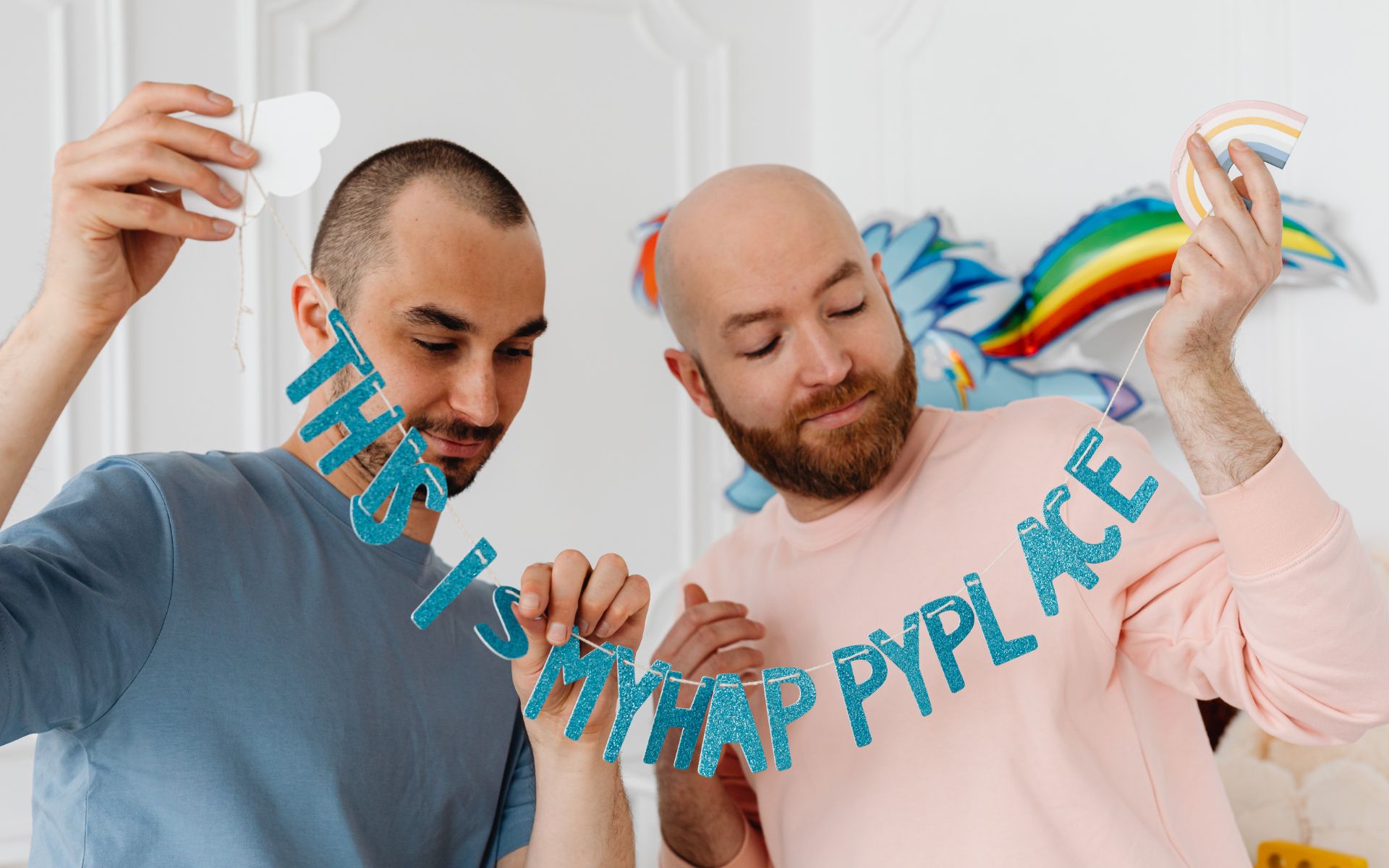Divorce is always a serious matter, and the divorce process can get complicated quickly. It may seem odd, but sometimes getting served divorce papers can come as a complete shock to people. Whether they never saw the writing on the wall or they were left in the complete dark about the issues in their marriage, there are countless reasons why someone could decide to file for divorce.
While working through the details of the separation, if there is anything that the spouses do not agree on, then it is considered a contested divorce. In a contested case, you can work with a lawyer who focuses on helping you protect your rights, make informed choices, and move things forward at a steady pace.
Working with a New York contested divorce lawyer can give you clear guidance and a plan. At Juan Luciano Divorce Lawyer, we can file the right paperwork, speak for you in court, and keep your goals front and center. We can also talk through how long getting a divorce can take, set realistic timelines, and move your case forward. Our aim is a fair result that protects your rights. If you want help on how to prepare for divorce, we can walk you step by step. Call us at (212) 537-5859 to get started.
What Can You Expect While Going Through The Process Of A Contested Divorce?
You can expect a lot of back and forth between you, your spouse, and your lawyers. That takes time. It can make each step feel slower than you hoped.
The hardest part is landing on terms you both can live with. Reaching an agreement on property, support, and parenting often takes rounds of proposals, counteroffers, and sometimes court appearances. All that negotiation adds stress to an already tough moment in your life.
More time usually means more costs. Legal work, filings, and hearings add up. If the case goes to trial, expenses rise for both sides.
What does this mean for you? Plan for a longer timeline, keep documents and deadlines organized, and stay in steady contact with your attorney. Small, practical steps help. When you’re ready to settle on workable terms, the process moves faster and the pressure starts to ease.

What Are the Key Issues in a Contested Divorce?
Contested divorces turn on a few key issues. First is child custody and parenting time. You and your spouse may disagree on legal custody, decision-making, school choice, and weekly schedules. Courts look at the child’s best interests, not who files first. Tied to that is child support. Income, childcare costs, and health insurance factor into the amount, and temporary orders can apply while the case is pending.
Next is property division. New York follows equitable distribution, which means pursuing a fair split of marital assets and debts, not always a 50/50 cut. Homes, retirement accounts, businesses, and stock options may need appraisals or a valuation. Separate property, like inheritances kept apart from marital funds, is usually off limits. However, any active appreciation to assets attributable to either spouse’s efforts can be distributable under DRL §236(B). Spousal maintenance can also be disputed. The court may award temporary and post-judgment maintenance based on income, need, and the standard of living experienced during the marriage.
Process issues matter too. The discovery process requires full financial disclosure, and fraud or concealment of assets can be penalized. Each side files a Statement of Net Worth, and the judge can issue temporary orders about finances, housing, or parenting while the case moves forward. Missed deadlines and incomplete documents slow everything down and raise costs.
A New York divorce attorney can help you focus on what matters, gather proof, and present a credible picture. You can get advice on settlement ranges, tax impacts, and QDROs for retirement funds. Your lawyer can negotiate on your behalf at conferences, draft proposals that protect your interests, and prepare you for trial if negotiations fail.
New York Contested Divorce Lawyer – Juan Luciano Divorce Lawyer

Juan Luciano
Juan Luciano helps clients minimize conflict and regain clarity through the emotionally taxing process of a contested divorce. He guides them toward objective decision-making that protects their families and their future.
From the outset, Mr. Luciano favors a collaborative, good-faith approach that seeks mutually beneficial outcomes. When negotiation can’t achieve a fair result, he is prepared to litigate and pursue your interests efficiently and decisively.
Mr. Luciano has built a stellar reputation across New York family law. His experience spans divorce, mediation, alimony and spousal support, child custody and support, prenuptial and postnuptial agreements, paternity, and related matters. A SUNY Buffalo Law graduate (J.D., 2004) admitted to the Appellate Division, Second Department in 2005, he maintains offices in Midtown and the Bronx and is fluent in Spanish.
Why Does a Divorce Take So Long?
New York has no statutory ‘waiting period’. The timing depends on court backlogs and cooperation. Uncontested cases often finalize in roughly 3–12 months, while contested cases commonly take 12–18 months or longer when there are disputes, discovery, expert valuations, or a trial. However, the exact timeline can vary significantly, particularly if there are extensive disagreements.
Several factors can influence the length of divorce proceedings, such as the presence of children, property division, and other related matters. The large amount of required paperwork and the need for the judge to carefully review it for compliance with divorce laws and the best interests of the children can extend the time it takes to complete the divorce. Additionally, the court’s schedule can also impact the overall duration of the process.
When spouses are unable to collaborate and resolve crucial issues, resolving these issues falls into the hands of the judge. This not only prolongs the process but also increases legal expenses due to additional fees for document preparation and court appearances.
In cases where disputed assets, such as retirement benefits or real estate investments, are involved, it is common to request appraisals to assign a specific monetary value to these assets. This process can also be both costly and time-consuming.
Each divorce case is unique, and the specific circumstances involved can impact the overall length of the divorce. It’s essential to consult with an experienced New York divorce lawyer who can guide you through the process and provide you with more accurate timelines based on your individual situation. Contact Juan Luciano Divorce Lawyer today for a consultation.
Does A Contested Divorce Mean You Have To Go To Trial At Divorce Court?
Most contested divorces never make it to a full trial. In many cases, you and your spouse work things out and put the terms in a Stipulation of Settlement. The court reviews that agreement and approves it when it’s acceptable. This approach saves valuable time, reduces emotional strain, and avoids a contentious courtroom battle.
If you reach an agreement, your attorneys will draft and file the paperwork to finalize your divorce. If you cannot agree on everything, the case moves to trial, and a judge decides the unresolved issues.
| Stage | Key Action | Timeline / Deadline |
|---|---|---|
| File & Serve Summons | Plaintiff files summons and complaint; defendant served | Service within 120 days of filing |
| Defendant’s Response | Defendant responds with Notice of Appearance or Answer | 20 days if served in NY, 30 days if outside NY |
| Request for Judicial Intervention (RJI) | Case assigned to a judge | Within 45 days of service (or 120 days with waiver) |
| Preliminary Conference & Net Worth Statement | Exchange financial disclosures; first conference | Net Worth Statement 10 days before conference; conference within about 45 days of RJI |
| Discovery & Trial Scheduling | Discovery completed; case set for trial or settlement | Discovery within 6 months of preliminary conference |
| Settlement or Trial | Resolve by agreement or trial | Trial usually scheduled within 6 months of preliminary conference |
What Does The Process Of A Contested Divorce Look Like?
When a divorce is filed, the other spouse is served and must respond within 20 days if served in New York, or 30 days if served outside New York. After that, the parties and their attorneys begin discovery to gather relevant financial and factual information (which can include subpoenas and depositions). Once the record is developed, counsel negotiate and prepare a settlement proposal. The outcome of those negotiations determines whether the case can be finalized on consent or must proceed to trial.
Once a divorce case is filed, the other spouse is served. If service happens in New York, a response is due in 20 days. If the service happens outside New York, the deadline is 30 days.
Next comes discovery. You, your spouse, and your lawyers exchange financial and factual information. This step can include subpoenas for records and depositions. Think of it as the stage where everyone puts the cards on the table so real progress can happen.
With that information in hand, your lawyer can prepare a settlement proposal. The attorneys talk through the issues, compare numbers, and try to close the gaps. Some parts wrap up quickly. Others take more time and go back and forth.
If you and your spouse reach an agreement, the court can finalize your divorce on consent. If you do not reach an agreement, the case moves to trial.
A New York contested divorce lawyer can step in as your guide and advocate at each stage. Our team can keep your case on track by handling filings, deadlines, subpoenas, and depositions so you do not have to. We can dig into the money details, work with outside professionals when needed, and build a clean record that supports your position. For legal guidance on your contested divorce in New York, Juan Luciano Divorce Lawyer can explain your options in plain language and keep you informed from day one.
Contact us today at (212) 537-5859 for a consultation.





